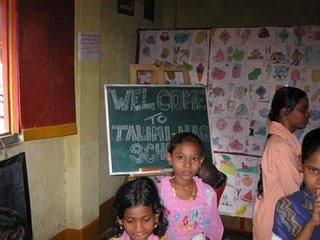
Here's a note from when Talimi Haq School was started (on 1 June 1998).
1. The school shall cater to : (a) Children of school-going age who are unable to go to school because of their poor backgrounds; and (b) working children who are not attending school.
2. A survey of slum households reveals that the largest group of children under the above two categories are in the 7-9 years (20 girls, 19 boys) and 10-12 years (43 boys) respectively. The final decision about the number of students in each class would depend upon space considerations as well.
3. The school shall run from 3 30 - 5 30 pm, and from 4 - 6 pm for the working children. School shall run for 6 six days in the week, with Sunday being the weekly holiday. The school shall have a proper annual calendar including vacations and holidays.
4. Each of these 2 hours school sessions will be divided into 4 half-hour periods.
5. Priority subjects shall be : Urdu, Arithmetic, English. Additional subjects shall be : History; Geography; Religious and Moral Education; Nature, Environment and Science; Social awareness; Drawing & Painting; Clay modelling; Craft; Singing; Physical culture; Drama.
6. Three periods each day during Monday to Friday would be devoted to the priority subjects. The fourth period on these days, and all the periods on Saturday, would be utilised to cover the additional subjects.
7. The whole emphasis, approach and objective of the school will be to stimulate the bodies, minds, feelings, creative and expressive faculties of the children. The school shall aim to equip the children to be honest, hard-working, capable and loving adults. Thus, no formal syllabus, or school board curriculum shall be followed. However, clear, meaningful targets (indicators) for attainment would be specified for each of the subjects, as well as in regard to the qualities and values sought to be inculcated. Value-oriented, and stimuli-oriented education would be sought to be concretised in terms of a practical and progressively developing routine of everyday practice. On the basis of this, lesso plans would be prepared. This would include teaching materials, primers etc. In essence, a single, comprehensive primer would be developed through the teaching, using the initial lesson plans as a starting point. Once the exact staff requirement is clear and the teachers have been recruited, there would be a orientation workshop on ‘Creative Education’. Such workshops would be organised on a regular basis with a view to developing high quality capabilities in this approach.
8. At this stage, the thinking is that the students shall remain in the school for a year, around which time a detailed review of the experiment would be undertaken. On the basis of this review (as well as practical matters such as finances), a decision would be taken about the future programme. Either the first batch would leave the school, after having developed a basic level of competence in the subjects and underlying values and qualities. Or, the batch would continue in the school for another 2-3 years, after which a fresh batch is taken on for another 3-4 years. Thus, one could hope to take responsibility for making a group of children into capable, honest and decent people.
9. Fees : There shall be an admission fee of Rs 10 per student, and a monthly fee of Rs 5. No school uniform, no text books to buy. Primers developed by the school would be distributed to the students, against a small contribution. Slate and pencil, and later, note-book, would have to be purchased by the students.
10. There would be a strong emphasis on cleanliness and proper behaviour and habits. Thus, clean clothing, hands, hair, face, nose, ears etc; classroom discipline, and behaviour outside the classroom.

No comments:
Post a Comment